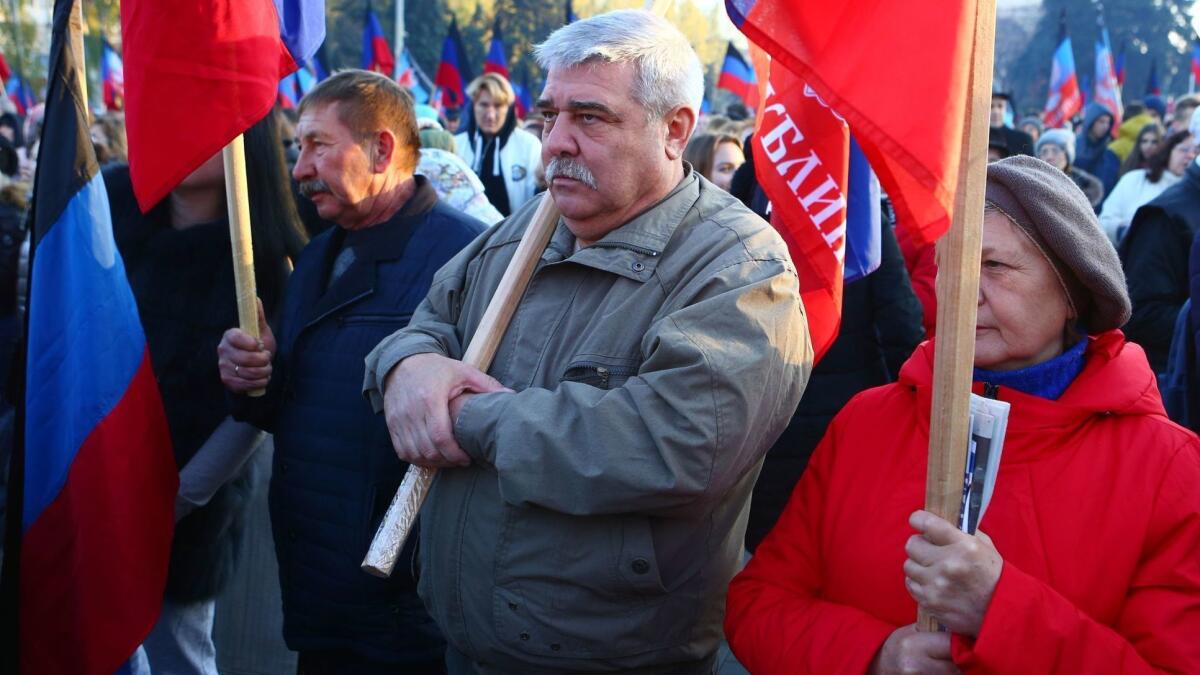U.S. urges Russia to halt elections in breakaway regions in eastern Ukraine

Reporting from Moscow — The United States is warning that elections scheduled for Sunday in the separatist regions of eastern Ukraine could derail efforts to resolve the ongoing military conflict between Russia-backed militias and Ukrainian forces. The fighting, now in its fifth year, has resulted in more than 10,300 deaths and the displacement of more than2 million people.
The rebel leaders of the so-called Donetsk and Luhansk People’s Republic in Ukraine’s eastern Donbas region set Sunday’s vote to choose the head of the separatist governments and their governing counsels. An estimated 3 million people live in the rebel-held territory, which Ukraine still considers part of the country.
Kurt Volker, U.S. special envoy to Ukraine, said the elections in the separatist regions run counter to a set of peace agreements known as the Minsk protocols signed by Ukraine, Russia and the two self-declared republics in 2015. Talks between the parties continue, although cease-fire violations on both sides have at times threatened to stymie their progress.
Both the U.S. and the European Union have called on Russia to put a stop to the election.
“This is a very concerning development,” Volker said in a press call this week about the upcoming elections.
The Minsk agreements call for the dissolution of the self-declared republics, an action that Volker has been urging since President Trump appointed him in July 2017. Once that happens, there “should be elections for the legitimate local authorities that exist within Ukraine’s constitutional framework,” he said.
Warfare erupted in eastern Ukraine in spring 2014, when Russia-backed separatist militias staged attacks after anti-government protests in the streets of Kiev, the Ukrainian capital, forcing Moscow-backed Ukrainian President Viktor Yanukovich to flee the country. The Russian-backed militias proceeded to declare the formation of two breakaway republics — the Donetsk People’s Republic and the Luhansk People’s Republic.
The Minsk agreements state that elections should be held in accordance with Ukrainian law and supervised by the Organization for Security and Cooperation in Europe, a multinational group that has monitored the conflict since 2014. Daily reports from the OSCE show ongoing fighting with most of the casualties being civilians caught in the crossfire.
The election is to be held two months after Alexander Zakharchenko, head of the Donetsk People’s Republic, died in a bomb explosion at a cafe in Donetsk, the largest city in the rebel-held region.
Russia has denied providing military backing to the separatists but has spoken openly about economically supporting the separatist-held region. The Kremlin has said the republics’ elections should move forward in order to “fill the power vacuum” left when Zakharchenko died.
Volker said he would be meeting in coming weeks with Russian President Vladimir Putin’s advisor on eastern Ukraine, Vladislav Surkov. A Ukrainian hacker group in 2016 released thousands of emails from Surkov that appeared to outline the Kremlin’s strategy for destabilizing eastern Ukraine and supporting pro-Russian movements. Surkov himself is believed by many to have orchestrated the movement that sparked the militia takeovers of the eastern Ukrainian regions.
“Volker has been saying for some time that in order to have progress at the negotiations, the people’s republics need to go away,” said Nikolaus von Twickel, an analyst with CivicMonitoring.org, a nonprofit group monitoring the human rights situation in eastern Ukraine. “But this is not going to happen, because this is exactly the vehicle that Surkov needs to continue the Kremlin’s grip over those areas.”
The U.S. and Ukraine consider the two republics and Crimea — which Russia annexed in March 2014 — as being illegally occupied by Russia or Russian-backed militias.
This week, the U.S. Treasury Department placed more sanctions on Moscow for its ongoing occupation of Crimea and its interference in eastern Ukraine. Two Russian individuals and a business entity were sanctioned for “serious human rights abuses.” Eight Russian entities, some of them hotel complexes near the Black Sea resort of Yalta, and one individual were sanctioned for “advancing Russian interests in Crimea.”
“What is notable here is that we have said for a long time that Russia has 100% command and control of what is happening in the occupied areas there — military forces, political entities and direct economic activity,” Volker said in the call with reporters. “This is the first step taken in the form of sanctions that explicitly recognizes or explicitly is based on the notion that Russia actually controls the Donbas and eastern Ukraine.”
Shortly after the Treasury Department announcement, Ukrainian President Petro Poroshenko posted a message on his Facebook page saying the new round of sanctions were a “clear message that all those involved in the illegal occupation of the Ukrainian peninsula and hybrid aggression in Donbas will not avoid responsibility.”
A spokesman for the Donetsk’s People’s Republic said its leaders have no intention of calling off the vote.
“Elections are the central institution of democracy,” said Natalya Nikonorova, acting foreign minister of the self-proclaimed Donetsk People’s Republic. “Attempts to call on the Russian Federation to somehow influence the upcoming elections raise eyebrows.”
Nikonorova said that calls to cancel the vote sounded like requests from “Western countries used to meddling in the domestic affairs of other states,” the Russian news agency Tass reported.
Twitter: @sabraayres
Ayres is a special correspondent.
More to Read
Sign up for Essential California
The most important California stories and recommendations in your inbox every morning.
You may occasionally receive promotional content from the Los Angeles Times.











